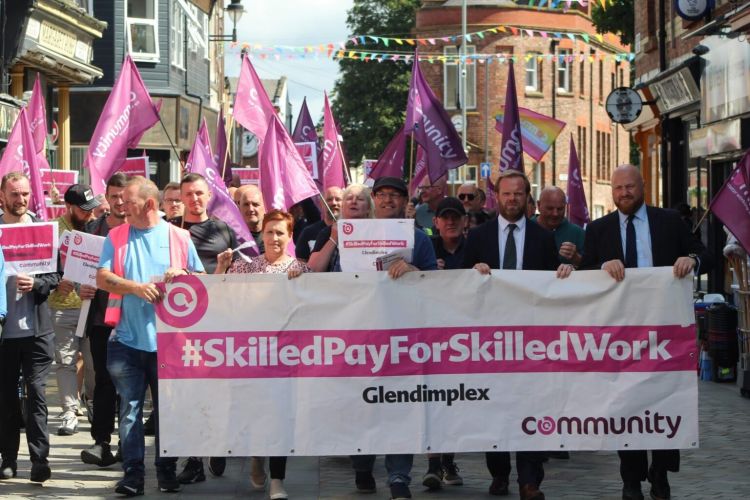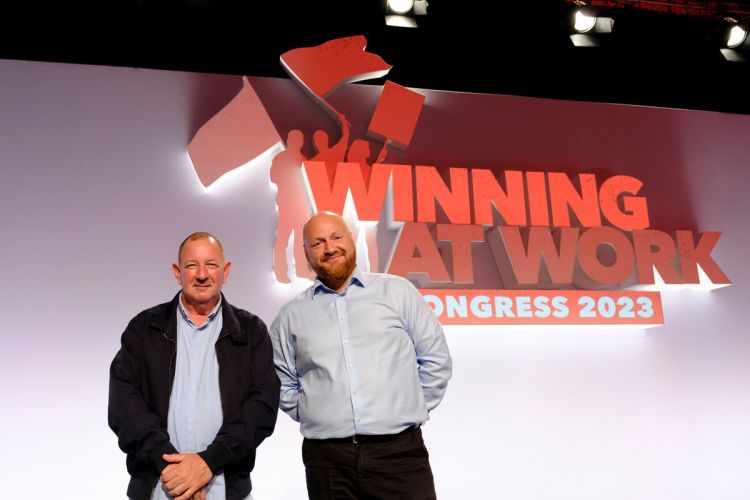Manufacturing a great pay win for Glen Dimplex workers

Glen Dimplex is a manufacturing company with offices around the globe. Their team in the UK includes workers in Prescot just outside Liverpool, where the workers are represented by the Community union.
Gavin told the TUC: “We started this round of pay negotiations back in November 2022. Initially the talks took place at local level and due to changes to the delegation over time there were delays in formulating a proposal.
“When the offer from management materialised, it was to go down from a 37-hour, 5-day week, to a 36-hour, 4-day week, and keep the pay the same.
“Ultimately, that meant pay packets stayed the same and we knew members needed more money in their pockets. The offer went to ballot in February 2023. At the time we had around 120 members, and they rejected it, by about 30 votes.
“That wasn’t a massive rejection, so we entered into constructive talks to try and address the reasons for the rejection.
“We knew our workers wanted to keep their 37-hour, 5-day week as the option of four longer days wasn’t something the workforce wanted – it meant people had to change their childcare plans or their social arrangements, and they didn’t want to do that. And they wanted more money in their pockets. The lowest paid workers were on £10.42 an hour and they needed more.
There was a deal to be done.
New reps
Gavin explained: “We had two new reps come on board at this point, Mark Thomas and David Cassidy, and they put forward three different ideas to management, to try and square off the talks and find a workable solution.
“But the company didn’t entertain any of the ideas and said they couldn’t up the hourly rate. Instead, they offered the same deal, but with a £250 one-off payment on top.
“The reps advised managers this wasn’t likely to get the thumbs up, but the company insisted this was all that was available, so we decided to let democracy and the ballot box decide. We balloted our members. We didn’t apply a recommendation either way, we wanted it to be a free vote.
“By now we were into May and the talks had been going on for six months already. The offer went to ballot and there were 113 rejections and only 17 votes in favour of doing the deal.
“This should have been a warning sign to managers to get a sensible offer on the table, as it was obvious the tide was turning. But management insisted there was no more money and nothing further they could offer.”
Industrial action
Gavin told the TUC: “The next stage was to ballot on industrial action. When the ballot papers were circulated, we didn’t advise members to vote a certain way or go round rallying them to respond. However, there was a 93% yes for industrial action vote on an 88% turnout – showing the strength of feeling there now was, in favour of a fairer pay award.
A very special moment – especially for one of the new reps who had come along to Congress with me, who had played such a pivotal and important role in this dispute on so little experience.
“The plant shuts down for two weeks at the end of July, so on the Friday before the shutdown we submitted our 14-day strike notice paperwork. We timed it so managers couldn’t put pressure on staff given there was a shutdown during the notice period."
Out on strike
Gavin said: “We went out on strike for the next two weeks, then came back in for a week on a work-to-rule and overtime ban basis. The picket line was so well supported. We had around 70 people a day to begin with, going up to 100 people. I believe that management had assumed the action would be half-hearted. It was anything but.
“We went back out on strike again for another week, this time issuing our notice on a weekly basis. That third week of strike action another 21 people joined the union. So, now we had 170 members and there were only 6 people going into work.
“When that happened, the company asked for Acas mediation, which was welcome from our point of view. Despite invoking that process, there were delays in entering the process despite us being available at any time for meaningful talks. Normally you’d meet with Acas for a full day in person to find a compromise, but we were offered a 90-minute online meeting which was odd given the circumstances.’
A birthday party
Gavin told the TUC: “We got to the 1 September without a resolution – and had a campaign day to mark our “10-month birthday” of pay negotiations. We had a birthday party and a cake on the picket line, to keep up the pressure and keep up morale.
“I tried to find a different focus every week for the picket line to keep everyone’s spirits up. We also had a march and a rally, the local MP, Marie Rimmer, came down and was supportive, and we were also cheered by visits to the picket line from TUC General Secretary Paul Nowak, and his colleagues Jay McKenna and Annaliese Midgely, Jay even spoke at the rally. We had great support from the TUC.
“We kept pressing and eventually management came back with an offer on a Friday morning, through another online meeting.
“The initial offer did not meet our expectations, and we knew it would be rejected if it went to ballot – that would have made the situation significantly worse. We wanted the next offer we put out to the vote to be one that was likely to be accepted.”
Red lines
Gavin explained: “We were clear that our red line was that the lowest paid staff needed to be on £11 an hour – and really, we wanted an aspirational rate of £11.20 an hour.
“We said that if the company could do this, we’d suspend the strike action and get back to work manufacturing again by the day after the ballot.”
“By the Monday lunchtime, management came through with that offer, and said that pay would be backdated, and the ballot was from 7-9am on the Tuesday. It was accepted as 125 staff voted for it – although 30 voted against it, which shows it wasn’t a landslide and the company need to be mindful of that when we go into the next round of pay talks.
“The deal was a good one – workers kept their 37-hour, 5-day weeks and the proposed review of contracts was cancelled. We only made one concession, that pay talks would move from 1 November to 1 April going forwards.”
“A credit to peaceful picketing”
Gavin said:
We got our win with perseverance, persistence and standing our ground. And the picket lines were a credit to peaceful picketing – there was no shouting or jeering, just applause and cheering. It really was a great, well-supported picket line from start to finish.

“And the icing on the cake was that we got our win on the Tuesday of the TUC’s annual Congress, and the conference was in Liverpool this year. So, we hot footed it down to the ACC centre to tell TUC Regional Secretary Jay McKenna the news.
“He was so delighted for us, he managed to get the TUC President to flag our win in her speech to the conference floor, and we were sat right up the front as the conference hall gave us a standing ovation.

